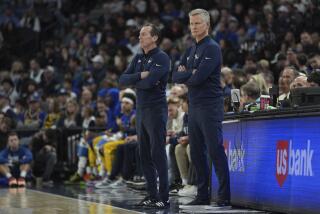There’s a Little Different Ring to Approach of New King Coach
HULL, Canada — The Stanley Cup ring that Wayne Gretzky wears is a mass of gold, a dazzle of diamonds.
A Stanley Cup ring is a wondrous thing. Rather common among the Kings, these days, but wondrous just the same.
Larry Robinson has a collection of Stanley Cup rings that he won while playing for the Montreal Canadiens. Mike Krushelnyski and Marty McSorley started their collections while playing with Gretzky at Edmonton. John Tonelli got his while with the New York Islanders.
The ring that their new coach, Tom Webster, wears is much smaller. It’s plain gold. No stone. It commemorates the year that he coached the Tulsa Oilers to the championship in the Central Hockey League. That same year, the league folded.
“That was, uh, 1983-84,” Webster says, holding the ring up at just the right angle so that he can read the date. “That was probably my most satisfying year as a coach. I felt so proud of what we were able to accomplish, in spite of some of the hardest obstacles, against the greatest odds.”
A brief silence greets this revelation.
Can he possibly be serious? Does he actually think it’s wise to call attention to his days with the Tulsa Oilers when the question underlying all the hundreds of questions put to him during this training camp, really, is whether or not he’s the right man to coach these Kings?
Webster seems not to notice the silence. He seems not at all concerned about convincing any reporters of anything. He’s not trying to be wise, any more than he’s trying to wise off.
He has been asked about his coaching history, and he’s happy to tell the war stories, telling them with the ease of a man who enjoys the folks around him whether those folks are strangers in an airport lounge, reporters in a press room or superstars on ice.
Webster zips right through the story of the season that his own team, the eventual champion, actually folded before the league did.
The oilman who owned the Oilers--an affiliate of the New York Rangers--had some money troubles and they found themselves without a rink. The league, however, decided to put the players and coaches in a hotel in Denver and had them finish the season as a traveling team, kind of like the Harlem Globetrotters.
“Valentine’s Day, we found out,” Webster says. “I said, ‘Isn’t this sweet?’ So our families all went home and we played our last 33 games on the road, and then all our playoff games. Which meant we played, maybe, 60 games of the total season away, putting to rest the notion that you can’t win on the road.”
Webster leans forward and smiles as he gets to the part that he knows is going to get a big reaction, even without having Ed McMahon to ask: “How bad was it?”
“At one point, while we were still in Tulsa, we were having to practice on the ice rink in a shopping mall. We’d have the players up at 5:30 in the morning, arriving in their gear. We couldn’t use pucks or we would have been breaking all the shop windows. So we practiced with a Nerf soccer ball!”
No more silence. Webster has won over his audience.
“It was an exciting season,” he says. “I had to improvise and adjust. We had to stick together as a team and do it as a team. We had fun with it. Ask Chris Kontos about it. Or Gord Walker or Ron Scott.”
Webster has just named everyone currently on the Kings’ uncut roster who can verify his stories. Who can say whether they had as much fun as their coach with what some might see as a nightmarish experience.
“Ask Robbie Ftorek, he was on that team.”
Now, there’s a punch line.
Robbie Ftorek’s name has been mentioned often during this training camp as everyone except Webster himself compares--or rather contrasts--Webster and Ftorek. Webster refuses to discuss the coach he replaced at the end of last season.
“That’s not fair for me to do,” Webster said. “Robbie is Robbie. He did his thing. You look at yourself and you do what is the best to suit the hockey club.”
The most obvious difference between the two is style. Ftorek set himself apart--from the fans, from reporters, often from the owner, even from the players. He apparently thought he never had to explain himself to anyone.
Webster is a communicator and a people person. As is the Kings’ owner, Bruce McNall.
McNall likes his team to be one big, happy family. So far, the family is happy with Webster.
Asked how he thought the team was reacting to Webster, McNall said: “Spectacular! All the players I’ve talked to really seem to enjoy him.
“He talks a lot. He’s a good communicator. We know he can be stern when he has to be. I think they have a great deal of respect for him.”
Gretzky backs that up, saying of Webster: “He’s first class. He has a tremendous amount of respect from all the players. He’s very fair. He’s easy to talk to and easy to deal with. He has the right attitude. He wants us to work hard, but enjoy it.”
Luc Robitaille’s early impression: “I like him. I can talk to him. I think you can say that he’s laid-back. But I wouldn’t want to fool with him.”
General Manager Rogie Vachon said: “He can compromise, but he can also be tough. This can be a tough team to handle because of the personalities. Some of the players who were regulars last year might not be this year. It might be hard to keep everyone happy.”
But at least Webster is concerned about doing that. He wants to keep the team in a happy balance. And he differs with Ftorek’s philosophy of treating all players the same. Remember Ftorek’s insistence that all players, including Gretzky, were just pieces of the puzzle?
Webster said of Gretzky: “He’s one of the best hockey players ever. Why not play him as much as I can? I’d be a fool not to play him as much as I can.”
Webster realizes that he’s dealing with a veteran team. He treats them accordingly. At 40, he’s older than any of them, but not by much.
And said that, depending upon how the season developed, he would have no problem with giving veterans such as Robinson and Gretzky extra days off, maybe even short vacations mid-season, if he thought it would help them be ready for the playoff stretch.
Asked if it bothered him that Gretzky is so close to McNall, and has been influential in whether deals were made or not made, Webster said: “Heck, no. The more you can get from everyone in the organization, the better. The successful organizations have staff, management and players working toward a common goal.”
The goal?
“The goal is the Stanley Cup,” he said without flinching. “It’s attainable. It’s there. We’ve made the proper acquisitions.”
Webster is, himself, one of the acquisitions. And he seems to understand all the attention being paid to how he sees his role with the team and how the team sees him.
“The coach is part of the team,” Webster said. “He’s a part of the team as well as the players. The job of the coach is to set some form of leadership and guidance. They look for that. And preparation. Having them prepared is my job.
“I need to help them with leadership, guidance, direction--and patience.”
He seems quite confident, but he knows there is some concern about his lack of experience as a National Hockey League coach.
Webster played in the NHL, for Detroit in 1970-71 and for Oakland in 1971-72, and in the World Hockey Assn., for New England 1972-79. He finished his playing career with one year in Detroit. He worked his way up through the coaching ranks, then, coaching the Red Wings of the American Hockey League to the Calder Cup title in 1981, and moving on to the Central Hockey League, where he won the title.
The Rangers hired him to coach in the NHL, but he coached only 14 games in the fall of 1986 before having to resign because of inner ear problems that required surgery and made it impossible for him to fly.
“The stint in New York helped prepare me for this job,” Webster said. “But going back to Windsor (to coach his hometown team in the Ontario Hockey League) helped, too. Coaching at any level gives you a chance to experiment, improvise, improve.”
And McNall likes to point out that Webster has won at every level.
He coached Windsor to an OHL title.
It’s all hockey.
Asked if he thinks that he is taking over one of the toughest jobs in hockey, if he thinks there is a gun at his head to win a Stanley Cup, he said: “I don’t think there is any easy job in coaching. You put pressure on yourself.
“I do think we are expected to win. But I think that’s good. It’s so nice to know that we have that kind of talent. It’s there. Now we just have to do it.”
That’s a pretty tall order, a pretty sobering thought.
Good thing he has those lucky purple Christian Dior socks his wife bought two years ago.
He blushed as he told it, but he was asked if he had any superstitions. A lot of the guys in hockey do, you know. So Webster had to tell about the World War II medal that his father, Tom, left him. And he had to tell about his ritual of eating spaghetti on the afternoon of a game. And the socks.
“This is embarrassing,” he moaned. “My wife said purple was the lucky color that year. When it turned out she was right, and those socks really were lucky, my son borrowed them and ended up scoring the winning goal in overtime one night. We haven’t washed them in two years.
“There’s more, but I’m afraid I’ve said too much already.”
Got any lucky sweaters?
“No, not sweaters,” he said, laughing as he saw the trap developing. “The sweaters are Robbie’s, and we’re not talking here about Robbie, are we?”
More to Read
Go beyond the scoreboard
Get the latest on L.A.'s teams in the daily Sports Report newsletter.
You may occasionally receive promotional content from the Los Angeles Times.






